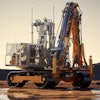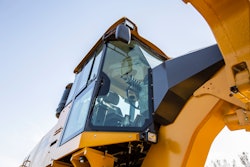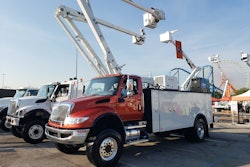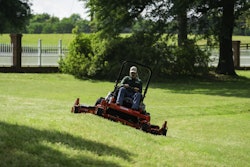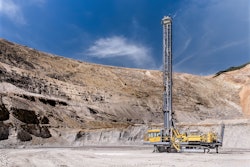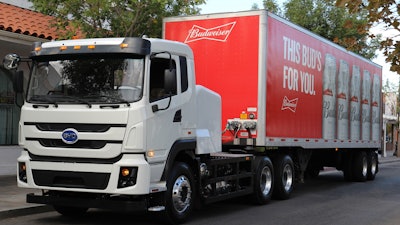
Electric vehicle manufacturer BYD (Build Your Dreams) announces Anheuser-Busch will deploy 21 BYD battery electric trucks in California. It will be the largest Class 8 electric truck deployment in North America, according to BYD.
Anheuser-Busch is adding the trucks to its California fleet as part of a state project known as ‘The Zero Emission Beverage Handling and Distribution at Scale.' Its aim is to showcase economically and environmentally sustainable warehousing and distribution technology.
The project includes equipment testing, a 1-year demonstration period, data collection and associated reporting. Trucks are anticipated to begin operation near the end of 2019, and project completion is expected in early 2021.
Second generation 8TT Class 8 electric trucks from BYD will be utilized at four distribution facilities across southern California— Sylmar, Riverside, Pomona, and Carson. The 100% electric trucks feature BYD's battery technology composed of environmentally friendly non-toxic ingredients. Noise and emissions are reduced, benefitting drivers as well as the communities in which these vehicles will operate.
Anheuser-Busch put the trucks through extensive testing for:
- range
- acceleration
- gradeability
- charging speed and more.
These are important criteria for any electric vehicle to meet in order to assure performance in daily duty cycles. BYD says the trucks exceeded the beer producer's expectations during the initial validation. Drivers also noted enthusiasm for driving the trucks, which helped lead Anheuser-Busch to its decision to deploy more of the electric vehicles.
“We’re honored to be part of this major milestone demonstrating the operational, economic, and environmental sustainability benefits of our zero-emission trucks,” says John Gerra, BYD Director of Business Development, Electric Trucks. “BYD trucks are out there right now working hard every day throughout California.”
Anheuser-Busch is partnering with ENGIE Services U.S. (ENGIE) to design and install charging infrastructure at the facilities where the trucks will be deployed. ENGIE also plans to install and commission a 958.5 kW solar array at Anheuser-Busch's Carson site to generate zero-emissions power for charging the trucks. This will help offset conventional energy that would otherwise be used to further reduce emissions and resource consumption.
“At Anheuser-Busch, we are committed to leading our industry towards a more sustainable future by reducing our carbon emissions across our value chain by 25% by 2025,” says Angie Slaughter, Vice President of Sustainability Procurement at Anheuser-Busch. “The transport industry is one that is prime for innovative solutions and we are excited to continue driving progress towards a zero-emission fleet through this partnership.”
The California Air Resources Board (CARB) awarded funds to the Center for Transportation and the Environment (CTE) which will be responsible for oversight of the project, as well as development, management and reporting. CTE will also provide technical support, risk analysis and mitigation strategies, permitting, equipment and station deployment, training, and assistance with commissioning.
The project is expected to result in emissions reductions of 910 metric tons of CO2 per year, the equivalent of taking almost 200 passenger vehicles off of the road. CARB anticipates the project will be replicated statewide.
“With this exciting project, Anheuser-Busch is providing a real-world demonstration of the future for moving goods and products throughout California,” says Richard Corey, Executive Officer at the California Air Resources Board. “I congratulate all the companies partnering on this impressive effort for embracing zero-emission trucks, and showing other businesses a zero-emissions solution to moving goods and cargo that cleans the air, protects our children’s health, and fights climate change.”




